Services > Ear Training
Ear Training in Branford
Are you a beginner pianist in Branford looking to improve your ear training skills? Our in-person ear training classes for beginners are here to provide you with the tools you need to develop your abilities and progress at your own pace. Our expert instructor, Linda Biggs, will guide you through the basics and beyond, teaching you essential skills such as identifying notes and chords by ear. Sign up for a free in-person ear training class today and start on the path to becoming the pianist you've always wanted to be!
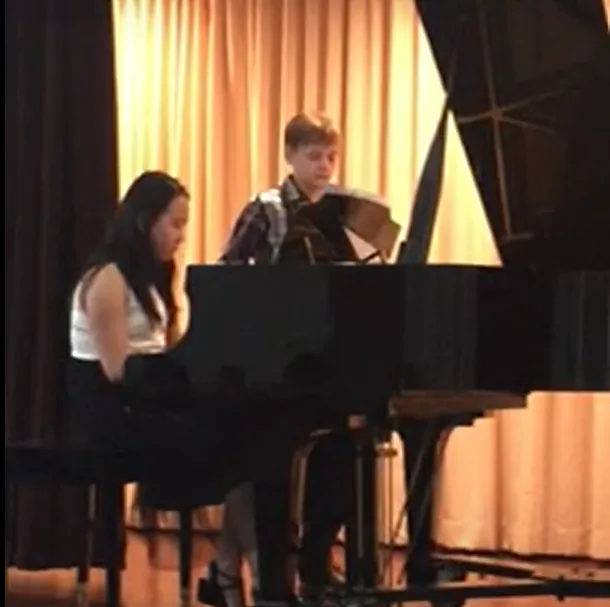
What is Ear Training for Beginners?
Ear training is the process of developing the ability to identify, transcribe, and replicate sounds, which is essential for becoming a proficient pianist. It is the foundation of all music education, and it is critical for developing a good sense of pitch and rhythm, as well as the ability to transcribe music by ear.
For pianists, ear training helps to improve the ability to identify and play notes, chords, and melodies by ear, without the use of sheet music. This allows pianists to develop their improvisational skills, play by ear, and compose their own music. It also helps pianists to become more proficient at reading sheet music, as they are able to hear the music in their head before playing it on the piano.
Additionally, ear training helps pianists to better understand the concepts of music theory, such as scales, chords, and intervals, as they learn to identify them by ear. It also improves the ability to sing in tune and to hear and play in harmony with other musicians.
In summary, ear training is essential for pianists of all skill levels. It helps to improve overall musicianship, and it allows pianists to become more proficient at reading sheet music, improvising, composing, and playing in harmony with others. Without proper ear training, pianists may struggle to fully understand and enjoy the beauty of music.
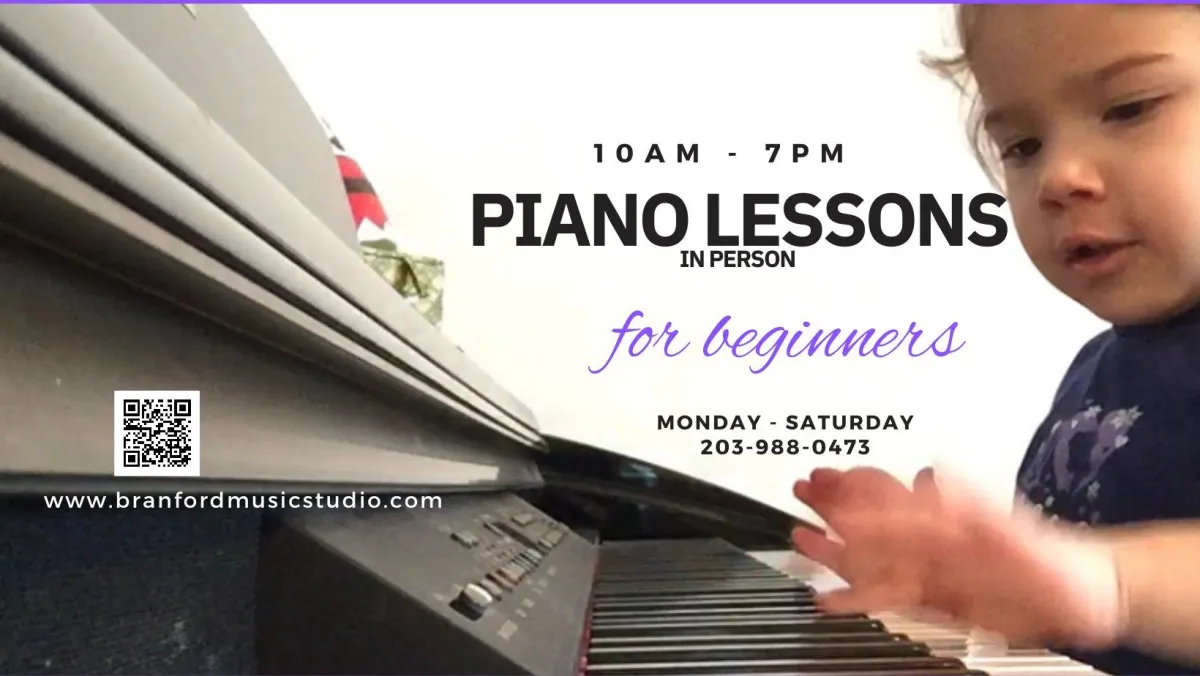
Benefits of Ear Training
Ear training is an essential aspect of becoming a proficient musician. It allows you to develop your ability to identify, transcribe, and replicate sounds, which improves your overall musicianship and enhances your understanding of music. Here are some of the key benefits of ear training:
✓ Improved Pitch Recognition: Ear training helps you identify and distinguish different notes and pitches, which is essential for reading sheet music and playing by ear.
✓Increased Musical Memory: By training your ears to recognize and remember melodies and chord progressions, you can improve your musical memory, which can be helpful for sight-reading and improvising.
✓Enhanced Musical Creativity: Ear training allows you to develop your musical imagination, which can inspire new compositions and arrangements.
✓Better Transcription Skills: Through ear training, you can learn to transcribe music by listening to recordings and reproducing them by playing an instrument.
✓Better Music Theory Understanding: Ear training can help you better understand the concepts of music theory, such as scales, chords, and intervals, as you learn to identify them by ear.
Overall, ear training is a valuable skill for any musician, whether you are a beginner or an experienced player. By dedicating time to ear training, you can improve your overall musicianship and reach new levels of creativity and expression in your playing.
Services > Ear Training

Ear Training in Branford
Are you a beginner pianist in Branford looking to improve your ear training skills? Our in-person ear training classes for beginners are here to provide you with the tools you need to develop your abilities and progress at your own pace. Our expert instructor, Linda Biggs, will guide you through the basics and beyond, teaching you essential skills such as identifying notes and chords by ear. Sign up for a free in-person ear training class today and start on the path to becoming the pianist you've always wanted to be!
What is Ear Training for Beginners?
Ear training is the process of developing the ability to identify, transcribe, and replicate sounds, which is essential for becoming a proficient pianist. It is the foundation of all music education, and it is critical for developing a good sense of pitch and rhythm, as well as the ability to transcribe music by ear.
For pianists, ear training helps to improve the ability to identify and play notes, chords, and melodies by ear, without the use of sheet music. This allows pianists to develop their improvisational skills, play by ear, and compose their own music. It also helps pianists to become more proficient at reading sheet music, as they are able to hear the music in their head before playing it on the piano.
Additionally, ear training helps pianists to better understand the concepts of music theory, such as scales, chords, and intervals, as they learn to identify them by ear. It also improves the ability to sing in tune and to hear and play in harmony with other musicians.
In summary, ear training is essential for pianists of all skill levels. It helps to improve overall musicianship, and it allows pianists to become more proficient at reading sheet music, improvising, composing, and playing in harmony with others. Without proper ear training, pianists may struggle to fully understand and enjoy the beauty of music.
Benefits of Ear Training

Ear training is an essential aspect of becoming a proficient musician. It allows you to develop your ability to identify, transcribe, and replicate sounds, which improves your overall musicianship and enhances your understanding of music. Here are some of the key benefits of ear training:
✓ Improved Pitch Recognition: Ear training helps you identify and distinguish different notes and pitches, which is essential for reading sheet music and playing by ear.
✓Increased Musical Memory: By training your ears to recognize and remember melodies and chord progressions, you can improve your musical memory, which can be helpful for sight-reading and improvising.
✓Enhanced Musical Creativity: Ear training allows you to develop your musical imagination, which can inspire new compositions and arrangements.
✓Better Transcription Skills: Through ear training, you can learn to transcribe music by listening to recordings and reproducing them by playing an instrument.
✓Better Music Theory Understanding: Ear training can help you better understand the concepts of music theory, such as scales, chords, and intervals, as you learn to identify them by ear.
Overall, ear training is a valuable skill for any musician, whether you are a beginner or an experienced player. By dedicating time to ear training, you can improve your overall musicianship and reach new levels of creativity and expression in your playing.
Our Students Playing On Stage After Taking Classes with Branford Music Studio
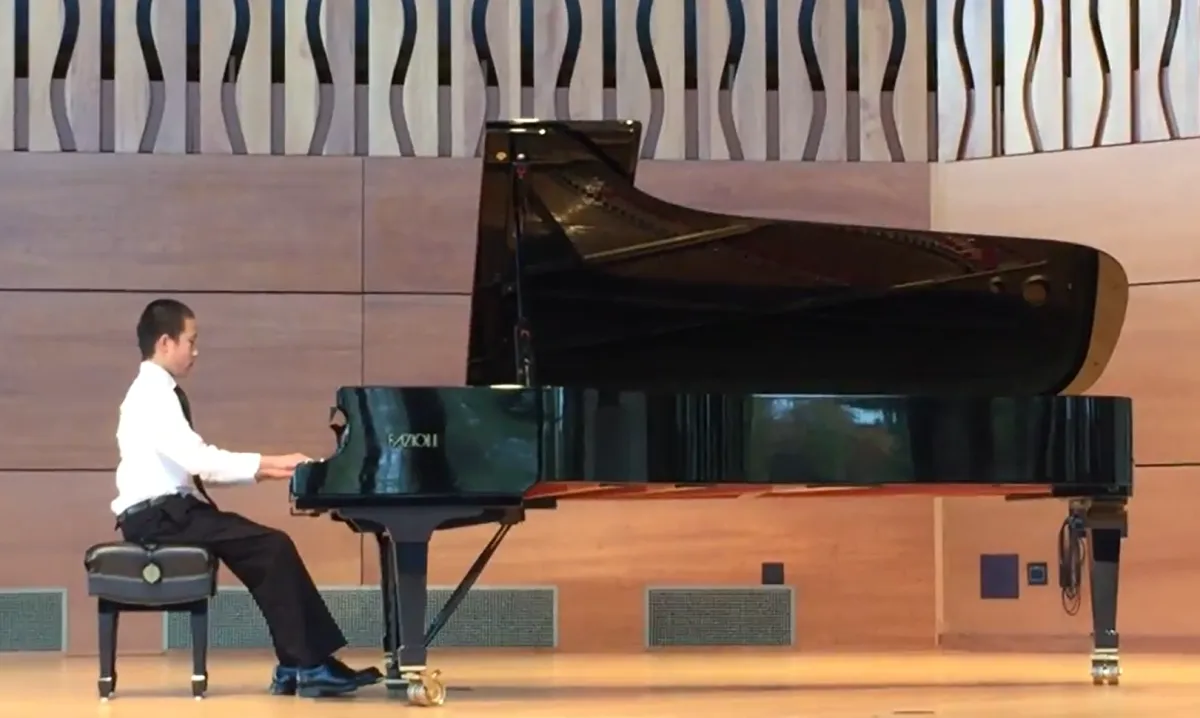
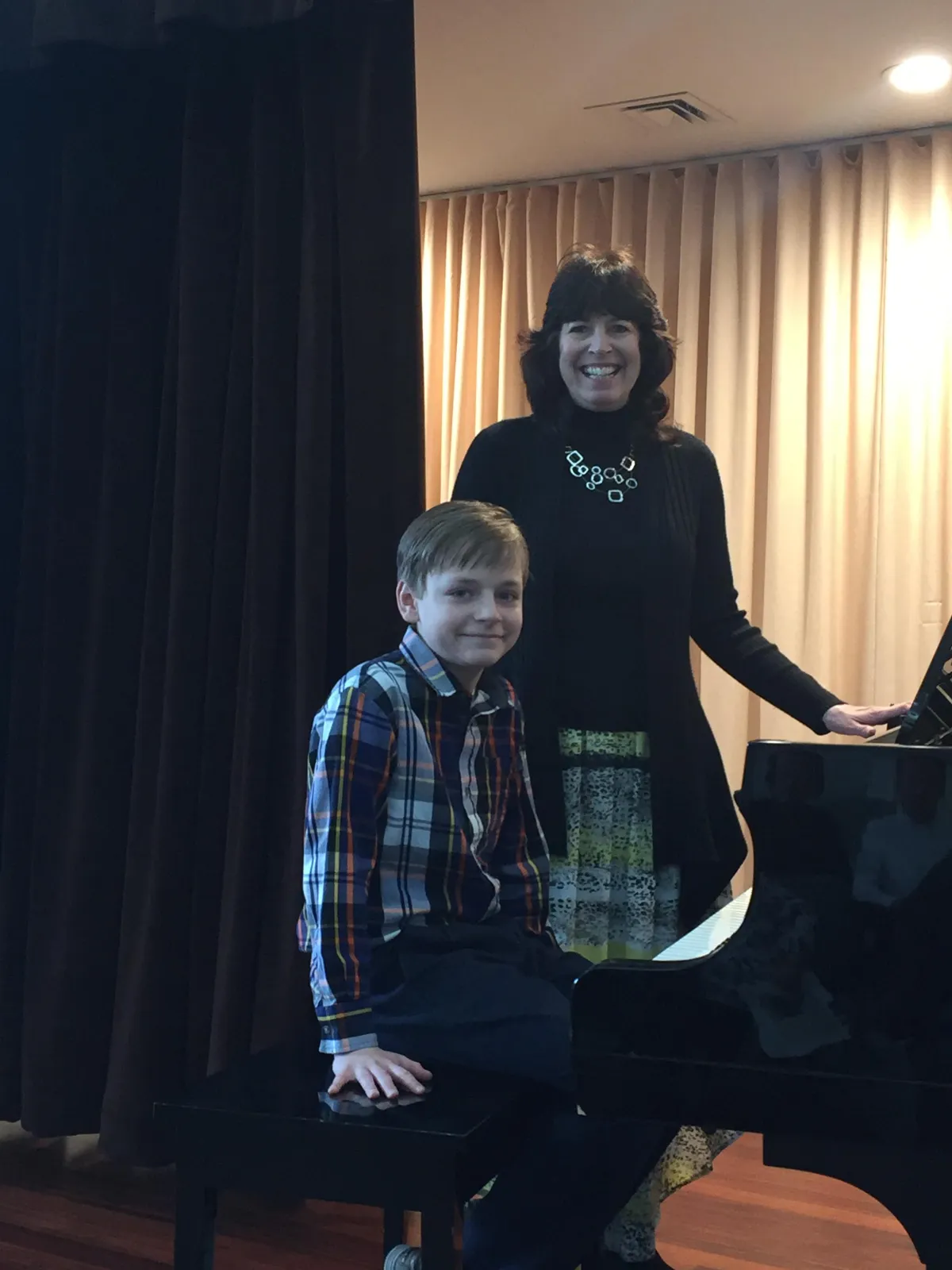

Our Students Playing On Stage After Taking Classes with Branford Music Studio



The 3-Step Process For Our
In-Person Piano Lesson
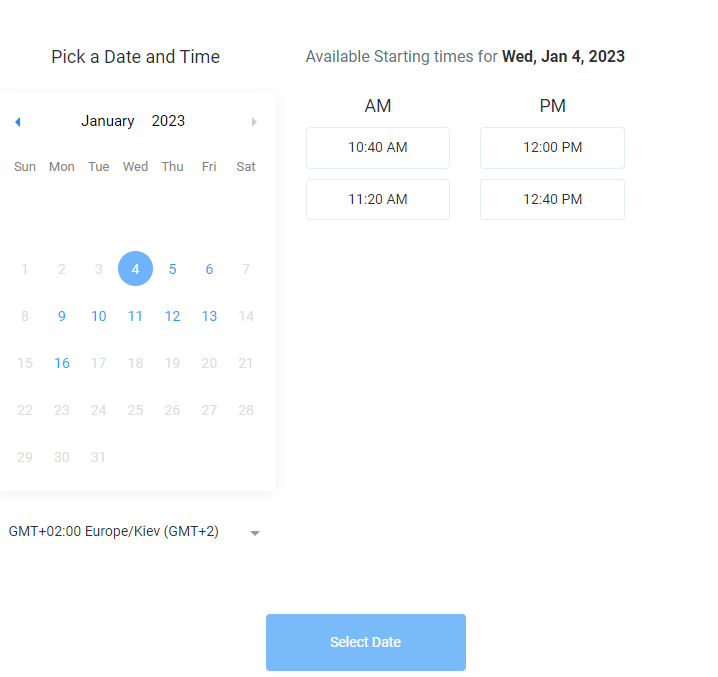
Schedule Your Free Session
Congratulations on taking the first step towards becoming a skilled pianist! The next step is to book your complimentary piano lesson on our website calendar by clicking the reservation button and selecting a time that suits you best.
We frequently update our calendar with available slots, so you have a range of options to choose from. Don't hesitate, schedule your lesson today and embark on your path to piano mastery!

Visit Our Studio Located in Branford, CT.
Now that you have scheduled your complimentary piano class, it's time to come to our Branford studio for your lesson. Please ensure to be present at the studio on the date and time you have booked, as our schedule is strict and we want to ensure that you make the most out of your class.
If you plan on driving, we have provided free parking at the studio location for your convenience. We are eager to see you and assist you in enhancing your piano skills at Branford Music Studio!


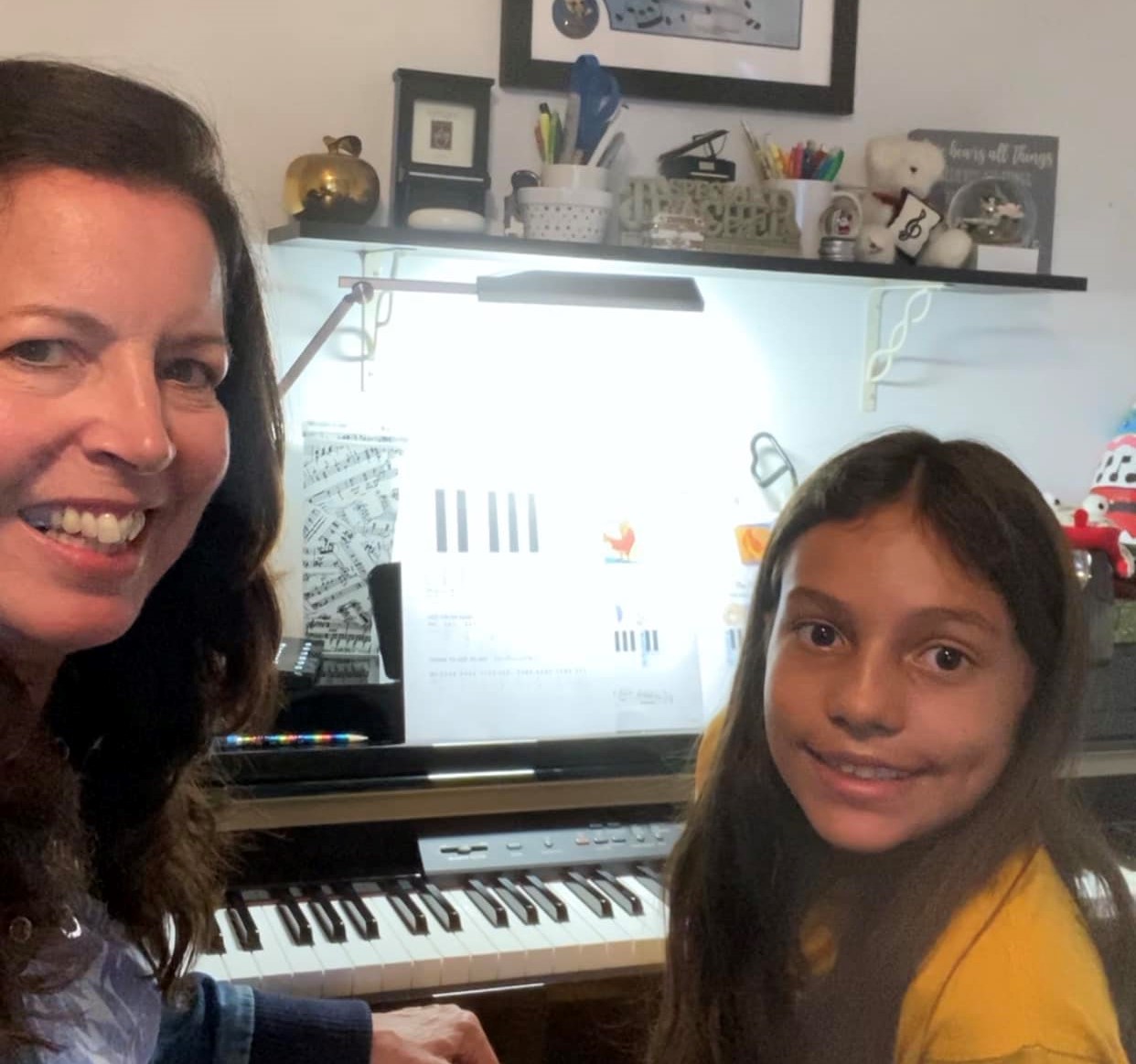
Have A Fantastic Breakthrough Piano Session with Branford Music Studio!
We are excited for you to attend your piano class at Branford Music Studio! Our instructor Linda Biggs is highly skilled and will guide you to have a fun learning experience, you'll begin playing music in no time.
Linda is a professional piano instructor and will help you reach your musical aspirations. You can be sure that you are in excellent hands, and we look forward to seeing your progress in your piano journey at Branford Music Studio. We'll see you soon!
The 3-Step Process For
Ear Training
Schedule Your Free Session

Congratulations on taking the first step towards becoming a skilled pianist! The next step is to book your complimentary piano lesson on our website calendar by clicking the reservation button and selecting a time that suits you best.
We frequently update our calendar with available slots, so you have a range of options to choose from. Don't hesitate, schedule your lesson today and embark on your path to piano mastery!

Visit Our Studio Located in Branford, CT.

Now that you have scheduled your complimentary piano class, it's time to come to our Branford studio for your lesson. Please ensure to be present at the studio on the date and time you have booked, as our schedule is strict and we want to ensure that you make the most out of your class.
If you plan on driving, we have provided free parking at the studio location for your convenience. We are eager to see you and assist you in enhancing your piano skills at Branford Music Studio!

Have A Fantastic Breakthrough Piano Session with Branford Music Studio!

We are excited for you to attend your piano class at Branford Music Studio! Our instructor Linda Biggs is highly skilled and will guide you to have a fun learning experience, you'll begin playing music in no time.
Linda is a professional piano instructor and will help you reach your musical aspirations. You can be sure that you are in excellent hands, and we look forward to seeing your progress in your piano journey at Branford Music Studio. We'll see you soon!
Things To Know About Ear Training
There is no age restriction for starting piano lessons, anyone can start learning piano at any age.
The age at which to start piano lessons is not fixed as every child develops differently. However, it is usually suggested that children start learning piano around the age of 5 or 6, as they usually have developed the required dexterity and attention span by this age.
Additionally, a child's eagerness and enthusiasm to learn should also be taken into consideration. If a child is excited about learning and can focus during practice sessions, they may be ready to start piano lessons at an earlier age.
It is not necessary to be able to read sheet music in order to play the piano, as there are alternative methods for learning and mastering the instrument.
Reading sheet music can be an advantage for pianists, but it is not a necessary condition for learning the piano. Some students may prefer to learn by ear or with the use of chord charts and other materials that don't involve sheet music reading.
However, sheet music reading can deepen a student's knowledge of music and increase the number of pieces they can play. Many piano teachers often integrate sheet music reading instruction with other piano skills and it can be developed over time as the student advances.
The amount of time it takes to learn to play the piano can vary for each individual.
The time it takes to learn piano can differ from person to person. Some may pick up the basics, such as posture and hand positioning, relatively quickly, while others may need more time to get the hang of things. With consistent practice and quality instruction, anyone can improve their piano playing skills over time. Sure, it may take some time to learn more challenging songs, but with dedication and practice, progress can be made.
To excel in playing piano, it is crucial to establish a regular practice routine and to create a conducive learning atmosphere at home.
When parents are considering piano lessons for their children, it is important to make sure the child is excited to learn and motivated. Additionally, finding a skilled and qualified piano teacher who can tailor the lessons to the child's individual needs and learning style is crucial. Furthermore, having a consistent practice schedule and fostering a supportive and positive learning environment at home are key for success.
Piano lessons can teach students the correct posture and hand positioning, finger exercises, scales, arpeggios, chord progressions, and sheet music interpretation.
Piano lessons provide a comprehensive set of technical and theoretical knowledge required for playing the piano, including proper posture and hand positioning, finger exercises, scales, arpeggios, chord progressions, and sheet music interpretation.
Through working on pieces, students will also improve their performance skills, musical expression and composition understanding. The curriculum may also include elements of music theory, ear training, and sight-reading to augment musical comprehension. The lessons will be tailored to the student's level, goals, and interests, determining the content and pace of instruction.
Having natural musical ability is not necessary to play the piano.
Being naturally gifted is not a pre-requisite to learn piano. Some may find it easier to learn, others may have to put in more effort to improve. However, with persistence and dedication, anyone can attain proficiency in playing the piano. A skilled piano instructor can guide and assist you in honing your skills, regardless of your initial level.
Things To Know About Ear Training
There is no age restriction for starting piano lessons, anyone can start learning piano at any age.
The age at which to start piano lessons is not fixed as every child develops differently. However, it is usually suggested that children start learning piano around the age of 5 or 6, as they usually have developed the required dexterity and attention span by this age.
Additionally, a child's eagerness and enthusiasm to learn should also be taken into consideration. If a child is excited about learning and can focus during practice sessions, they may be ready to start piano lessons at an earlier age.
It is not necessary to be able to read sheet music in order to play the piano, as there are alternative methods for learning and mastering the instrument.
Reading sheet music can be an advantage for pianists, but it is not a necessary condition for learning the piano. Some students may prefer to learn by ear or with the use of chord charts and other materials that don't involve sheet music reading.
However, sheet music reading can deepen a student's knowledge of music and increase the number of pieces they can play. Many piano teachers often integrate sheet music reading instruction with other piano skills and it can be developed over time as the student advances.
The amount of time it takes to learn to play the piano can vary for each student.
The time it takes to learn piano can differ from person to person. Some may pick up the basics, such as posture and hand positioning, relatively quickly, while others may need more time to get the hang of things. With consistent practice and quality instruction, anyone can improve their piano playing skills over time. Sure, it may take some time to learn more challenging songs, but with dedication and practice, progress can be made.
To excel in playing piano, it is crucial to establish a regular practice routine and to create a conducive learning atmosphere at home.
When parents are considering piano lessons for their children, it is important to make sure the child is excited to learn and motivated. Additionally, finding a skilled and qualified piano teacher who can tailor the lessons to the child's individual needs and learning style is crucial. Furthermore, having a consistent practice schedule and fostering a supportive and positive learning environment at home are key for success.
Piano lessons can teach students the correct posture and hand positioning, finger exercises, scales, arpeggios, chord progressions, and sheet music interpretation.
Piano lessons provide a comprehensive set of technical and theoretical knowledge required for playing the piano, including proper posture and hand positioning, finger exercises, scales, arpeggios, chord progressions, and sheet music interpretation.
Through working on pieces, students will also improve their performance skills, musical expression and composition understanding. The curriculum may also include elements of music theory, ear training, and sight-reading to augment musical comprehension. The lessons will be tailored to the student's level, goals, and interests, determining the content and pace of instruction.
Having natural musical ability is not necessary to play the piano.
Being naturally gifted is not a pre-requisite to learn piano. Some may find it easier to learn, others may have to put in more effort to improve. However, with persistence and dedication, anyone can attain proficiency in playing the piano. A skilled piano instructor can guide and assist you in honing your skills, regardless of your initial level.







